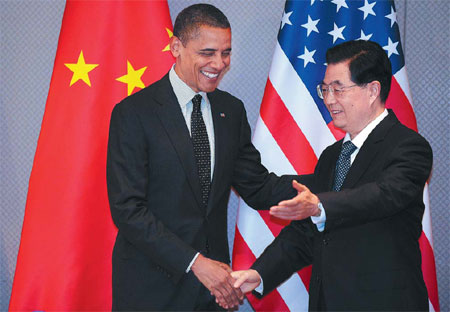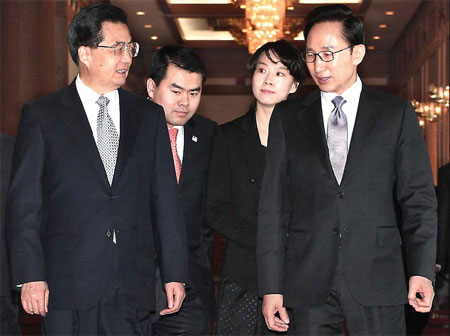Hu urges calm amid satellite row
Updated: 2012-03-27 08:19
By Wu Jiao in Seoul and Zhou Wa in Beijing (China Daily)
|
||||||||
|
|
|
|
President highlights recent easing of tension on the Korean Peninsula
The hard-won reduction of tension on the Korean Peninsula must not be lost, President Hu Jintao said on Monday amid growing concern over a planned satellite launch by the Democratic People's Republic of Korea next month.
Hu made the remarks as he met US President Barack Obama and Lee Myung-bak, the president of the Republic of Korea, on Monday at the 2012 Nuclear Security Summit.
The summit is focusing on agreeing international measures to protect nuclear materials and facilities from falling into the hands of terror groups. The Korean Peninsula nuclear issue is not on its agenda.
The DPRK's announcement 10 days ago that it plans to blast a satellite into space next month aboard a long-range rocket - a launch that the US views as cover for nuclear missile development, grabbed the international headlines as heads of state gathered in Seoul for the two-day summit.
Obama urged the DPRK leaders to abandon their launch plan or risk jeopardizing their country's future and thwarting a recent US pledge of food aid in return for nuclear and missile test moratoriums - considered a breakthrough after years of deadlock, the Associated Press reported.
The ROK government warned that it might shoot down the rocket if it violates ROK airspace.
Both US and ROK leaders also want China to use its influence in the region to help ease tension.
According to Assistant Foreign Minister Ma Zhaoxu, Hu said in the meeting with Obama that China is concerned about the DPRK's satellite launch.
"We have urged relevant parties to remain clam and exercise restraint, and prevent an escalation of tension. This serves the common interests of all parties," Hu said.
China hopes the US and the DPRK will continue with contact and dialogue, uphold the consensus already achieved, and improve relations, Hu said.
Hu emphasized, in his meeting with Lee, that "at present, the situation on the Korean Peninsula is very complicated and sensitive. We hope we do not see a reversal of the hard-won relaxation of tension on the peninsula".
Hu urged that all parties should remain calm.
"China is ready to work with other parties and continue to make active efforts toward peace and stability on the Korean Peninsula," Hu said.
Progress was made on the Korean nuclear issue last month with Pyongyang and Washington striking a deal in which the US agreed to provide 240,000 tons of food as aid to the DPRK in exchange for Pyongyang's promise to impose a moratorium on nuclear tests and missile launches, and allow checks by international nuclear inspectors.
Yet earlier this month the DPRK announced it will launch in mid-April an "Earth observation" satellite, or the Kwangmyongsong-3, using a long-range rocket to blast off from its satellite launching station in the western DPRK.
The launch is scheduled for between April 12 and 16 to mark the 100th anniversary of the birth of Kim Il-sung, the DPRK's founder and grandfather of current leader Kim Jong-un.
The ROK voiced its "serious concern" over the plan, calling it a "grave provocation threatening the peace and security" on the Korean Peninsula as well as Northeast Asia.
The DPRK insists its satellite launches are for peaceful and scientific purposes.
Moscow also said resumption of the long-stalled talks and diplomatic solutions are the only viable options available to both deal with the nuclear issue in the region and to lift UN sanctions against the DPRK, which is prohibited from conducting launches that use ballistic missile technology.
However, Moscow also said it had never denied the DPRK's sovereign right to pursue peaceful space programs and urged all parties involved to exercise maximum restraint.
The US and the ROK have tried to use the nuclear security summit to draw attention to the Korean Peninsula nuclear issue and put more pressure on the DPRK.
Given China's influence, Obama "felt it was very important for us to be working closely with China and for China to be sending a very strong message to DPRK", Ben Rhodes, a deputy national security adviser was quoted by AFP as saying.
Hu's comments showed China shared concerns on the situation with other countries and was determined to reach a peaceful solution, said Wang Junsheng, an expert on Asian studies at the Chinese Academy of Social Sciences.
"China is the only country which has a stable relationship with all the other members of the Six-Party Talks, so China's mediation among them is extremely important," Wang said.
"The situation on the Korean Peninsula is not likely to get out of control, because all parties want to ease tension."
The situation is very fragile, due to different factors, said Shen Dingli, an expert on international relations with Shanghai-based Fudan University.
The two presidents also discussed the Iranian nuclear issue, with both welcoming upcoming diplomatic efforts by the "P5 plus One Group" to end the nuclear standoff.
The group, the five permanent members of the UN Security Council plus Germany, is trying to broker a solution but Obama warned earlier on Monday that "time is short".
Hu urged that the US should continue to adhere to the policy of engagement to solve the Iranian nuclear issue.
"China does not approve of the development of nuclear weapons by Iran or any country in the Middle East, and China believes that dialogue and negotiation are the only right way to resolve the issue," Hu said.
Contact the writers at wujiao@chinadaily.com.cn and zhouwa@chinadaily.com.cn

 Relief reaches isolated village
Relief reaches isolated village
 Rainfall poses new threats to quake-hit region
Rainfall poses new threats to quake-hit region
 Funerals begin for Boston bombing victims
Funerals begin for Boston bombing victims
 Quake takeaway from China's Air Force
Quake takeaway from China's Air Force
 Obama celebrates young inventors at science fair
Obama celebrates young inventors at science fair
 Earth Day marked around the world
Earth Day marked around the world
 Volunteer team helping students find sense of normalcy
Volunteer team helping students find sense of normalcy
 Ethnic groups quick to join rescue efforts
Ethnic groups quick to join rescue efforts
Most Viewed
Editor's Picks

|

|

|

|

|

|
Today's Top News
Health new priority for quake zone
Xi meets US top military officer
Japan's boats driven out of Diaoyu
China mulls online shopping legislation
Bird flu death toll rises to 22
Putin appoints new ambassador to China
Japanese ships blocked from Diaoyu Islands
Inspired by Guan, more Chinese pick up golf
US Weekly

|

|








